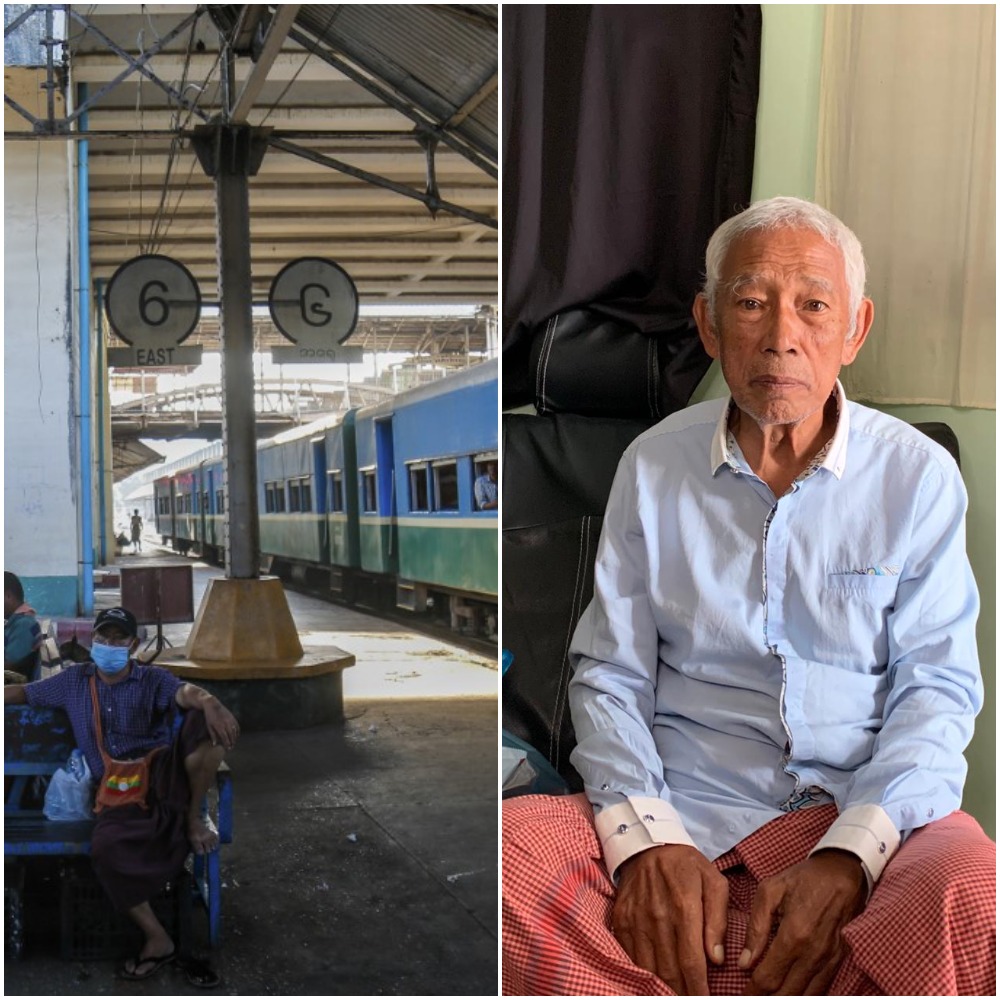
Though the chug of an engine is rarely heard at Yangon Central Railway Station these days, the platforms are packed with people. Myanmar’s largest train station has become not a place of transit but a home, a battered community whose members rely on the generosity of strangers and trace their situation back to the chaos sown by Covid-19.
Among them is Myint Hlaing, a 77-year-old watchmaker who has been waiting for a train for 117 days, sleeping at one platform or another. It was cataracts that brought him to Yangon, for surgery at the non-profit Jivitadana Sangha Hospital in Bahan township on August 29. But after taking a bus from his home in the eastern Shan state town of Tachileik to Meiktila in central Myanmar and then hitchhiking to the city, he arrived only to find that the hospital was temporarily closed.
Then came the second wave and another dose of restrictions: stay-at-home orders, no crowds, curfew and a ban on cross-country passenger trains and buses, which had been running on staggered schedules since the virus was first confirmed in Myanmar nine months ago.
He tried his luck at the central station anyway, hoping to board a carriage in the evening back to central Myanmar and take it from there. Instead, tired, he laid out his spare longgyi in the car park, resting his head on his bag, and slept.
It was his second time in the commercial hub, the first being two years ago for free eye surgery at the same hospital. The city was quieter now, under semi-lockdown, and it felt even more unfamiliar to him. That next night, while he slept, someone stole nearly all his cash—80,000 kyats (US$59)—and the four watches he had planned to sell, he said.
“I felt completely exasperated,” Myint Hlaing told Myanmar Mix. “I had nothing to eat and only 2,000 kyats ($1.5) left in my shirt pocket.”
The next four months would not get much better. Daytime he accepted donations from passersby outside a nearby Methodist church and nightly he spread out a blanket between other platform dwellers, squatting mosquitoes until sleep came.
When he borrowed mobile phones to call his only relative, a son in Tachileik, the number did not work, he said. But he has taken some solace from the volunteers who bring meals to the station at dusk.
Almost 200 people sleep there and about 30 like Myint Hlaing are stranded, according to Moe Marn of the charity Myanma Sate Yinn, which distributes food to the homeless.
Many came from remote villages to look for work in Yangon and haven’t got the money or means to leave, he said. Some are waiting for rescheduled surgeries despite lacking the funds for lodgings; they now scrape through the refuse for scraps to sell. Locals come to the platforms too on hearing of the free meals, added Moe Marn—even more so since factory closures and the job haemorrhage.
“It’s dangerous for the people gathered at the station and the people they come into contact with,” he said. “Without shelter, access to masks or hygiene products, they are more likely to contract the virus and other diseases.”
As Win Aung, 51, sat on a platform, saying that he was evicted in September and had little choice but to take refuge at the station, a trash collector joined the conversation.
“I’ve tested positive for Covid-19,” she said. “And my son.”
Presented with such dire health risks, Myint Hlaing was brought to live at the Myanma Sate Yinn office in South Dagon Township on December 13 until the volunteers can arrange for his return journey.
“I vaguely remember hiding and sleeping in pagodas during armed conflict when I was a child,” said Myint Hlaing. “But I’ve never experienced something like this before. Right now, I just want to go home.”

